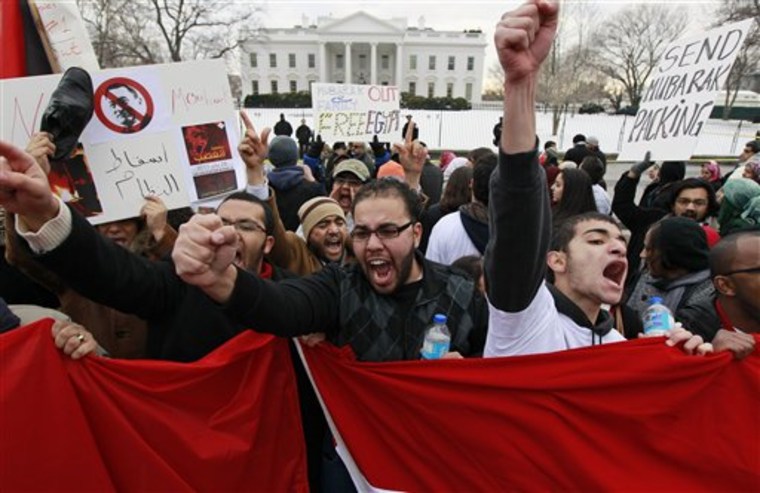The United States is asking besieged Egyptian President Hosni Mubarak to lift the emergency police powers that have safeguarded his iron rule while focusing behind the scenes on elections this fall that could be a chance to achieve a legitimate democracy without Mubarak in control, administration officials said.
Two American officials said the U.S. government would prefer that Mubarak, 82, not run for re-election in presidential voting scheduled for September.
The officials spoke on condition of anonymity because of the sensitivity of diplomacy and the difficult situation the Obama administration finds itself in.
In public, the administration would say only that elections should be open and fair.
"The United States government does not determine who's on the ballot," White House press secretary Robert Gibbs said Monday.
Neither Gibbs nor State Department spokesman P.J. Crowley would say what the U.S. thinks Mubarak should do. Options include that Mubarak would step aside in favor of his newly named deputy Omar Suleiman, or announce that he will not run for re-election in the fall.
"That is not for our country or our government to determine," Gibbs said. "I don't think that people that seek greater freedom are looking for somebody else to pick what and how that change looks like."
Push for 'concrete steps,' not appointmentsWashington is trying to smooth the way for a more representative government in Egypt without alienating pro-democracy protesters or its ally over three decades.
The U.S. is pressing Mubarak to institute a set of reforms as a first step toward meeting the demands of protesters clamoring for his ouster. The immediate gestures are for Mubarak to lift emergency laws in place since 1981, allow non-governmental organizations to operate and free political prisoners. Elections would follow on schedule.
The U.S. cannot force Mubarak to accept any of those conditions, although it has leverage born of 30 years of partnership and billions in aid.
Gibbs dismissed Mubarak's move Monday to appoint a new government, saying the situation in Egypt calls for action, not appointments.
Mubarak named a new government in an apparent attempt to defuse the weeklong political upheaval in his country. Tens of thousands of demonstrators have flooded the streets, calling for his ouster.
American officials continued to wrestle with the dilemma Monday of strengthening support for peaceful demonstrations, while not completely undercutting Mubarak, whose close cooperation with the United States on Israeli-Arab peace talks and other issues has made Egypt America's most important ally in the Arab world.
A coalition of opposition groups has called for a million people to take to Cairo's streets Tuesday to demand Mubarak's removal. In an apparent attempt to defuse the weeklong political upheaval, Mubarak named a new government Monday, but the appointments were treated with scorn by demonstrators.
The United States, too, is unsatisfied with the response so far from Mubarak, officials said.
President Barack Obama called last week for "concrete steps" to expand rights, but avoided outlining the specific steps expected of Mubarak.
Part of the hesitancy is that the U.S. doesn't want to give the impression that its backing for Mubarak is contingent on a small list of reforms.
The White House's balancing actOtherwise, a new dilemma could arise. If the Egyptian government meets U.S. expectations, does the Obama administration congratulate Mubarak and risk undercutting Egyptian democracy activists? Or, does it continue to press for greater reforms, potentially alienating an ally even while it is showing signs of becoming a democracy?
The U.S. would likely have to respond to genuine reforms in Egypt with a delicate combination of support for pro-democracy reforms as they are instituted, and calls for continued action.
Beginning less than two weeks after Tunisian protesters ousted their long-time president, the Egyptian unrest has had the United States in a bind since its start. The U.S. has spent billions establishing Egypt as a bulwark of American influence in the Middle East and the government's collapse could threaten efforts from an Israeli-Palestinian peace deal to counterterrorism operations and pressure on Iran.
Secretary of State Hillary Rodham Clinton appealed Sunday for an orderly transition to lasting democracy in Egypt and said U.S. officials "obviously want to see people who are truly committed to democracy, not to imposing any ideology on Egyptians."
She warned Sunday against a takeover resembling the one in Iran three decades ago, with a "small group that doesn't represent the full diversity of Egyptian society" seizing control and imposing its ideological beliefs.
The unspoken concern is that an Egyptian revolution could make American foreign policy dramatically more difficult in the Middle East.
